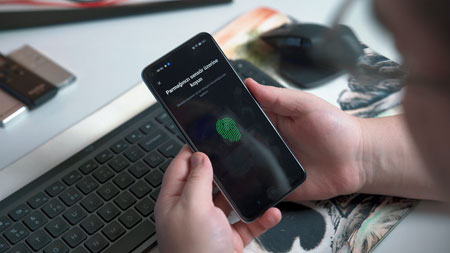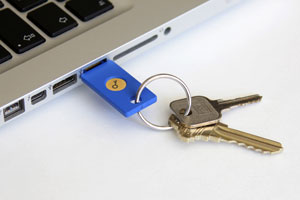Multifactor Authentication
MFA, 2FA, 2SV & biometrics
Cell Phones | Authenticator Apps | YubiKey | Biometrics
MFA Issues | Going Passwordless
All trademarks, company names or logos are the property of their respective owners.

Multifactor authentication (MFA) has replaced the term two-factor authentication (2FA). This implies the ability to have more than two authentication methods. Some companies use 2SV (two-step verification). Multi-factor verification (MFV) is emerging in corporate circles where the identity of the individual is the focus.
Here's the fact: over 81% of company data breaches occur due to poor passwords. There's a reason why Alice Henshaw enjoyed a whopping 80% success rate in guessing 14 million business passwords.What is more, research found that 51% of employees use the same password for their work and personal accounts. But here's the good news: multi-factor authentication can block over 99% of account compromise attacks, blocking malicious actors from moving past the barrier.
— Prodaft
The authentication device is preferably something that is always with you and is inaccessible to potential hackers.
[T]here are three generally recognized factors for authentication: something you know (such as a password), something you have (such as a hardware token or cell phone), and something you are (such as your fingerprint).Biometric scanners for fingerprints and retinas or faces are on the upswing thanks to innovations such as Apple's Face ID and Windows Hello.
But in most cases, the extra authentication is simply a numeric string, a few digits sent to your phone, as a code that can only be used once.
— PCMag
In most cases, once you're set up MFA, you cannot return to password-only authentication. Recovery methods vary by vendor.
Remember this as you panic over how hard this all sounds: Being secure isn't easy.The bad guys count on you being lax.
Implementing MFA will mean it takes a little longer to log in each time on a new device, but it's worth it in the long run to avoid serious theft, be it of your identity, data, or money.
— PCMag
- Multi-factor authentication: Who has it and how to set it up.
- How to set up two-factor authentication on your online accounts.
- The safer way to sign in to all of your online accounts.
- Not all MFA is equal: Lessons from MFA bypass attacks.
- What is the evolution of multi factor authentication?
- Identity In the digital age and the rise of multi-factor verification.
The methods and terminology may vary by vendor. It is recommended that you follow the instructions for each account protected by MFA including documenting how to recover if your MFA fails for whatever reason.
- Bitwarden's field guide to two-step login
- Two-factor authentication for Apple ID has replaced two-step verification.
- How to help keep your Microsoft Account safe and secure.
There are several multifactor options for devices to protect your password.
One of the earliest was confirmation via email which is still the method used to verify questionable actions like the change in a password or access from an unknown location.
These MFA options are discussed in more detail:
Cell Phones
A cell phone is something that most people have and it is usually with them at all times.
Most commonly, SMS is used for verification, but the mobile number may also be a backup security method.
SIM Card Hijacking
Unfortunately, it appears that it isn't that hard to hijack your cellphone's SIM card.
They may only require the last 4 digits of the credit card that pays for your account to gain access to the very multifactor authentication that is supposed to protect you.
Hackers have discovered that one of the most central elements of online security — the mobile phone number — is also one of the easiest to steal.
— NY Times
If the Phone is Unavailable
Even in this age of ubiquitous cell phone ownership, some folks just don't have one or cannot afford the bandwidth.
The other problem is the loss of your phone or it becoming unavailable to you for other reasons such as being out of a coverage area or on holiday.
Authenticator Apps
Given the potential vulnerability of cell phones, a better solution might be authenticator apps.
Google provides the Google Authenticator for both Android and iOS. Microsoft Authenticator app can also be used on non-Microsoft accounts.
- Download and install the Authy Authenticator app.
- Download and install the Microsoft Authenticator app.
- How to use the Microsoft Authenticator app.
- Add non-Microsoft accounts to the Microsoft Authenticator app.
- Google Authenticator.
- The best authenticator apps — PCMag.
YubiKey Verification
This section explains the advantages of YubiKey, but there are other alternatives. Your choice should be made based upon what works best for you yet is secure enough for your circumstances.
About YubiKey
Yubico was founded to set new global authentication standards, enabling one single security key to access computers, phones, networks and online services—all in a simple touch.We named our invention the YubiKey — your ubiquitous key.
— YubiKey
The YubiKey is a hardware authentication device, designed to provide an easy to use and secure compliment to the traditional user name and password.
Password Invalid Without Device
Like the cellphone, a USB device like this can be used as another level of security. Unless the person attempting to use the password has the device, the password will not be accepted.
A premium edition of your password manager software may be necessary when combined with a YubiKey.
How YubiKey Connects
YubiKey is dependent upon a USB-A or USB-C port or a NFC connection plus the software to make it work.
YubiKey can be used with USB-C adapters but not all adapters worked well, including the Apple USB-C Multi-adapter.
The YubiKey is not a biometric device. The fingertip is used to activate the device, not for authentication.
Mobile Devices
Since most mobile devices lack USB ports, YubiKey provide a NFC option.
YubiKey supports strong authentication for iOS and Android smartphones and tablets.
NFC usage on iPhones is only supported on the iPhone 7 and newer, running iOS 11.3.1 and newer.
Many environments restrict mobile device use altogether making most MFA methods unusable. See how you can ensure strong security with ease, all without a cellular connection.
— YubiKey
See YubiKey solutions for the latest updates.
Biometric Verification
Biometric verification is an attractive alternative because it is difficult to duplicate and the technology is attainable.
Biometrics has the potential to make authentication dramatically faster, easier and more secure than traditional passwords, but companies need to be careful about the biometric data they collect.After all, while it's easy to issue a new password when the old one has been compromised, you can't issue someone a new eyeball.
— CSO
Ensure Data Verified Securely
Apple introduced fingerprint scanning with their iPhone 5S. As Apple quickly learned, the issue is privacy and personal security.
You don't want to be sending your biometric data to every site you log onto.
Microsoft provided biometric verification in Windows 10 with Windows Hello, provided you have the supporting hardware.
Intel True Key allows you to sign in with your face or fingerprint (on supporting hardware) and provides optional multifactor authentication.
Vendors, through the Fido Alliance, are working on a standardized authentication protocol to verify your identity using a private key so that your biometric scan never leaves the device.
It is anticipated that this technology could eventually replace the tricky and risky use of passwords altogether.
It Can Be Used Against You
While convenient, you might find that biometric authentication such as your finger to open your device or personal accounts without your express permission.
Even the best technology makes mistakes, EFF's Hayley Tsukayama said. If the software confuses someone's identity, it will be important that workers have the right to appeal. The stakes are particularly high with biometric data, she says."No one can issue me new fingerprints. No one can issue me a new face. And so if that information is hacked, for example, and in a format where other people can use it, that's the whole game."
— The Wall Street Journal
Choose carefully what items are verified by biometric data under certain circumstances such as when crossing borders.
- What is biometrics? 10 physical and behavioral identifiers that can be used for authentication.
- Hacking fingerprints is actually pretty easy — and cheap.
Issues with MFA
Unfortunately, MFA has begun to suffer from weaknesses and is being exploited by cybercriminals.
Business Email Compromise
Larger businesses are being subjected to an advanced phishing attack called business email compromise where emails are spoofed that request unauthorized payments.
SIM Card Fraud
SIM card fraud is where someone other than yourself convinces the cell carrier to transfer your cell number to a new SIM card.
Your phone will no longer work and the new owner will have access to all your MFA requiring access to your phone.
Locked Out?
What if you're locked out of your MFA-protected account? How do you recover your account?
Multi-factor authentication (MFA) is simply the best thing you can do to keep bad guys from accessing your accounts. But what happens if you lose your security key, delete your authenticator app, or lose all your devices and can't prove you're you? It's a nightmare scenario, but don't panic!Fortunately, there are some things you can do if you find yourself locked out of an account secured with MFA: use a device that's still logged in, use an alternative MFA option, or contact customer support.
— PCMag
The key is to be prepared for that eventuality before it happens. As with insurance or a backup of your data, a crisis is the worst time to find out that you're unprepared.
Bitwarden's documentation about two-step login includes information about how to set up two-step authentication, alternative authentication methods (may require Bitwarden Premium), and what to do if you lose access to your authentication method.
Going Passwordless
Another variation that isn't really a two-factor solution but which uses a similar process is discussed in how to kill the password: don't ask for one.
Instead of entering a password, you enter an email address or phone number and the temporary password lands in your Inbox or on your cell phone.
No permanent password exists.
Of course, if your email account's password is insecure (or can be hacked using weak password-recovery options) this provides no security at all.
The best option for now is an authentication app which does the same thing, but more securely.
Related Resources
On this site:
- Resources index
- Passwords
- Password managers
- The LastPass breach
- Security basics
- Security strategies
- Security policies
- Data inheritance
- Encryption: protecting your data
- Your privacy at risk
- Oversharing on social media?
- Identity theft
- Phishing & email scams
- Malware & spyware
Return to top
RussHarvey.bc.ca/resources/mfa.html
Updated: February 19, 2025



